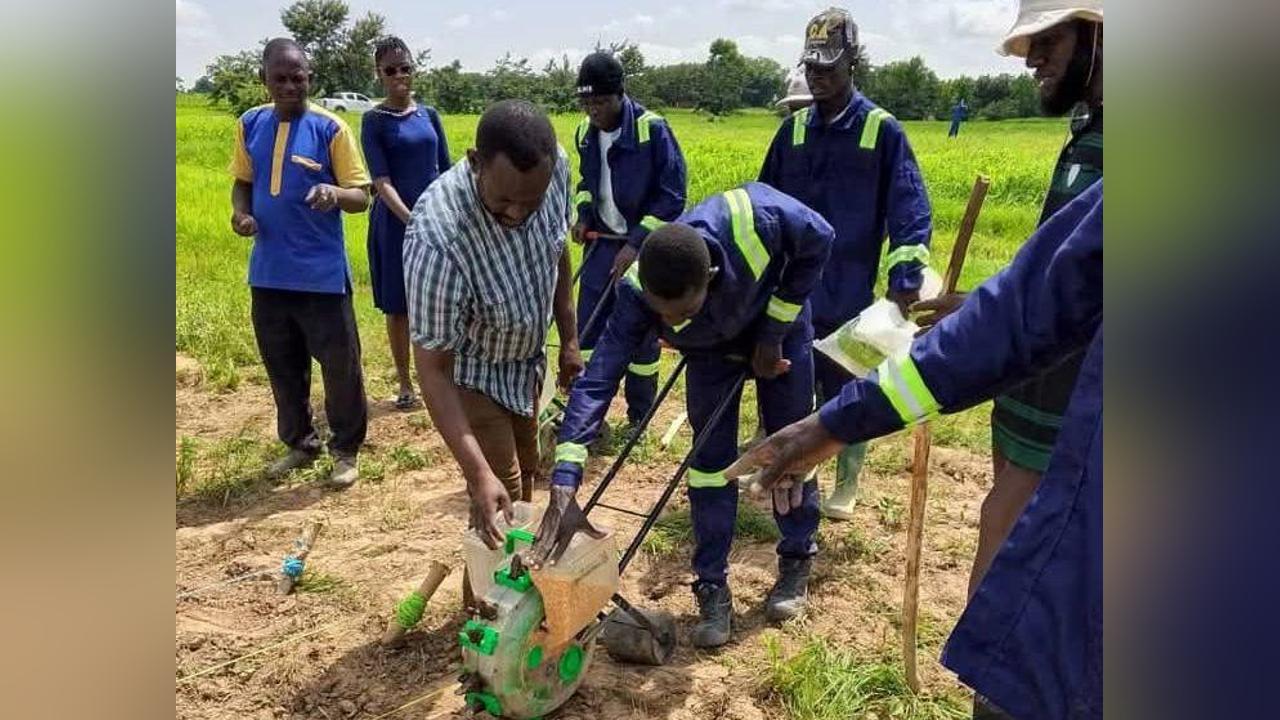Africa-Press – Ghana. The Dagomba people of the Northern Region of Ghana, have a profound proverb which says Kpɛm’ ku do duu ka kpɛya bu saa, which literally mean “there will not be an elder in the house while the rain is beating the fermented millet that is drying in the sun.” In other words, things will not get spoilt while there is an elder or wise person amongst you.
This proverbial wisdom aptly reflects the leadership of Naa Iddrisu Mahama Sintaro, Chief of Sakoya in the Tijo Traditional Area of the Mion District.
With a firm commitment to sustainable agriculture, Naa Sintaro is spearheading a quiet farming revolution, one that is helping secure food for the future, empowering women and youth, and building climate resilience across Northern Ghana.
Facing a Growing Challenge.
Ghana is grappling with rising food insecurity and erratic rainfall exacerbated by climate change. According to the Ghana Statistical Service (GSS) Annual Household Income and Expenditure Survey for the first half of 2022, nearly half of the population, 49.1% was food insecure, with rural areas being hit hardest.
But amid these challenges, Naa Sintaro is offering a new path forward through conservation agriculture and mechanization, approaches that are creating jobs and restoring degraded farmlands.
A Leader with Global Experience and Local Commitment
Born in Yendi in the early 1960s, Naa Sintaro received his basic education in Yendi and Tamale before advancing his studies in Malaysia.
He holds a Master’s degree in Business Administration, specializing in supply chain management and quality assurance.
Over a career spanning more than 25 years, he held senior roles with the International Federation of the Red Cross and Red Crescent Societies, leading livelihood and capacity-building programmes across Asia, Africa, and the Pacific.
On his return to Ghana, he was enskinned as Chief of Sakoya.
Driven by his passion for environmental sustainability, he established Tibzaa Integrated Farms, a pioneering initiative promoting conservation agriculture.
At his Tamale residence alone, he has planted over 5,000 tree species, demonstrating his deep commitment to restoring the land.
Championing Conservation Agriculture
Naa Sintaro underscored the value of conservation agriculture in combating climate-related farming challenges.
“Conservation agriculture is the key to building resilient farms,” he said.
“We must empower farmers to adapt, innovate, and protect their land.”
Key practices such as minimal soil disturbance, permanent soil cover, and crop rotation, he noted, help improve soil health, retain moisture, and increase biodiversity, while reducing reliance on chemical inputs.
Training the Next Generation: Tibzaa Institute
To scale his efforts, Naa Sintaro founded the Tibzaa Institute of Agribusiness and Technology, a social agribusiness hub training smallholder farmers in sustainable agriculture, livestock production, and mechanization.
The institute has trained over 3,500 women and youth, including students from Dabokpa Technical Institute, in modern farming techniques.
Through its out-grower scheme, farmers cultivate maize, soybeans, sorghum, and cowpea across Mion, Nanton, and Karaga districts.
“Tibzaa has taught us how to farm smarter, not harder,” said Mariam Fuseini, a young out-grower in Sakoya. “I now know how to manage my land better and earn more from it.”
The initiative also boasts of access to over 15,850 acres of land for multi-crop farming and has constructed a dam serving eleven communities, enabling irrigation and year-round food production.
The Road Ahead: Investing in Climate-Smart Agriculture
Naa Sintaro believes that Ghana’s agricultural future rests on a foundation of sustainability, innovation, and inclusive development and proposes multiple strategies to deepen national progress:
Firstly, Naa Sintaro underscores the importance of farmers receiving training in soil conservation, integrated pest management, and efficient water use.
He emphasized the need for Government, NGOs, and private investors to support youth-led agriculture initiatives that needed entrepreneurship and innovation.
Naa Sintaro proposed that digital tools, precision agriculture, and climate-smart solutions should be scaled up to boost productivity and sustainability.
A Model Worth Emulating.
Through his visionary leadership, Naa Iddrisu Mahama Sintaro is demonstrating that sustainable farming is not just an environmental choice, it is an economic and moral imperative.
His example offers a blueprint for local leaders, policymakers, and development partners seeking to transform Ghana’s agriculture into a resilient, inclusive, and food-secure sector.
Source: Ghana News Agency
For More News And Analysis About Ghana Follow Africa-Press







